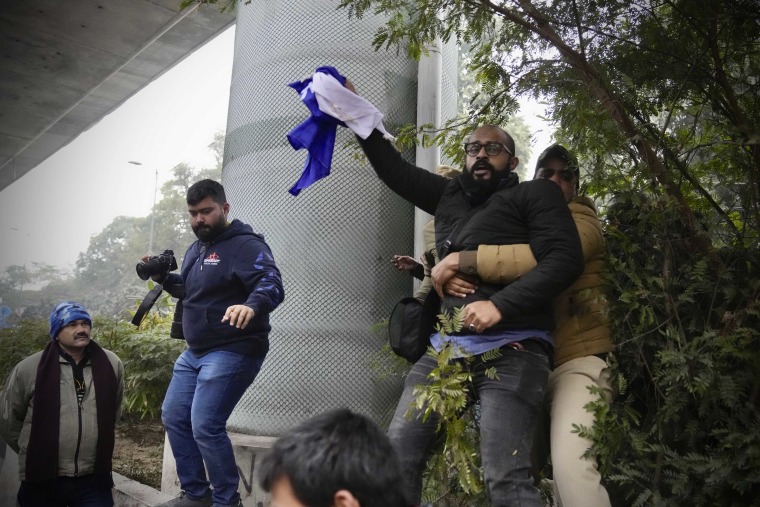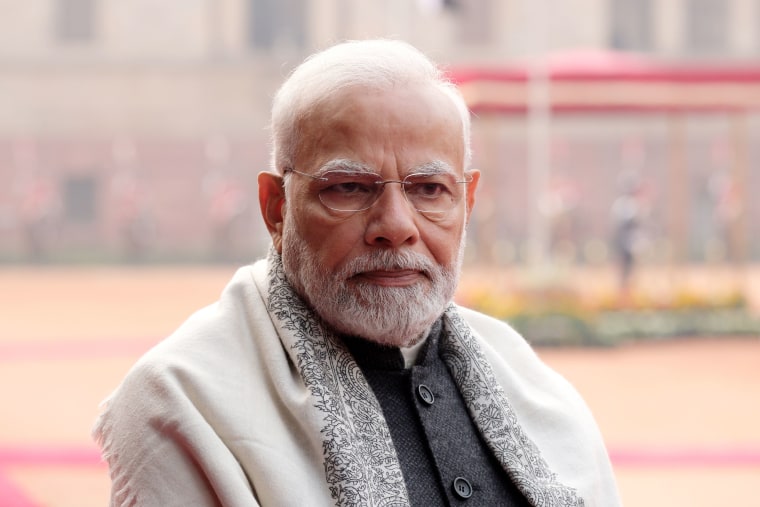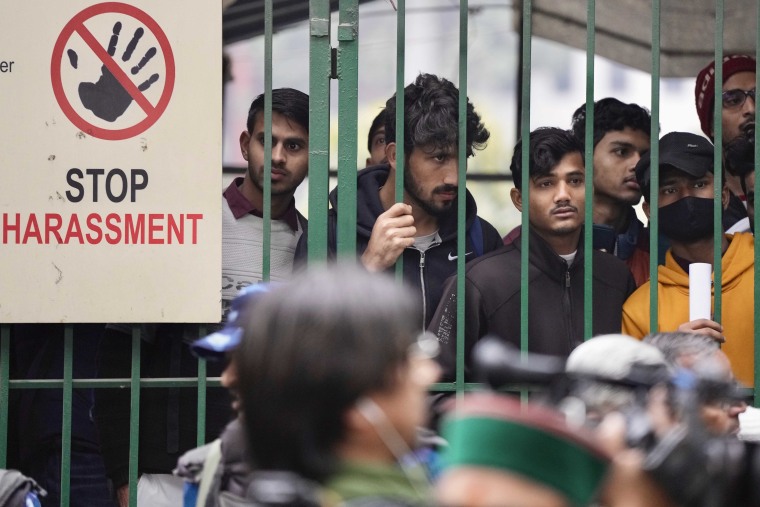[ad_1]
SRINAGAR, India — When the lights have been instantly lower off, the gang of younger folks switched on the flashlights on their smartphones. They turned them towards the seat of a bike, the place scholar activist Aishe Ghosh stood in defiance.
“They will shut one screen, we will open hundreds,” she shouted.
The college students had gathered at Jawaharlal Nehru University in New Delhi, the Indian capital, for an outside screening of a new BBC documentary that’s vital of Prime Minister Narendra Modi and his position within the lethal 2002 riots in Gujarat when he was the western state’s chief minister.
After the ability outage — Ghosh blames the college administration, which hasn’t commented on it publicly — college students streamed the movie on their telephones and laptops as a substitute, both by means of VPNs or by sharing proxy hyperlinks to archived footage through encrypted apps.
Authorities in India, the world’s largest democracy, have gone to extraordinary lengths to cease folks contained in the nation from seeing the movie for the reason that first half aired in Britain final week, invoking emergency powers to order the elimination of any clips or hyperlinks which can be posted on social media platforms together with YouTube and Twitter. For Indians dismayed by what they see as rising authoritarianism beneath Modi and his Hindu nationalist Bharatiya Janata Party, watching the documentary has change into a logo of protest.

Many of India’s younger folks don’t have any reminiscence of the riots, wherein greater than 1,000 folks, most of them Muslims, have been killed. Modi denies being complicit within the assaults, and India’s Supreme Court upheld a ruling final yr that he ought to be cleared of all costs.
Over half of India’s 1.4 billion individuals are beneath the age of 30, and they’re shaping as much as be a pivotal political drive within the 2024 basic election and past, Ghosh advised NBC News.
“It is very important for the BJP to control these minds,” she stated.
Arindam Bagchi, spokesperson for India’s Ministry of External Affairs, known as the BBC movie, “India: The Modi Question,” a “propaganda piece designed to push a particular discredited narrative” and stated it mirrored a “colonial mind-set.”
In an announcement, the British broadcaster stated that the movie had been “rigorously researched” and that the Indian authorities had declined to touch upon the allegations.
The first a part of the documentary is about Modi’s political profession earlier than he grew to become prime minister. Gujarat was convulsed by riots in early 2002 when Hindu mobs, blaming Muslims for the deaths of 59 Hindu pilgrims in a prepare fireplace, retaliated in opposition to Muslim communities.

According to the movie, British officers stated the violence bore “the hallmarks of ethnic cleansing” and that Modi, as chief minister, was “directly responsible” for letting it occur.
Harsh Mander, who stop his job as a civil servant to change into a rights activist after the riots in Gujarat, stated they “showed us a very different India than what we had promised ourselves at independence” in 1947.
“Today’s generation needs to see what happened in 2002 and make an informed choice,” he added. “Is this the India you want?”
For years, Modi was barred from touring to the United States over his position within the riots, being invited again solely after he grew to become prime minister in 2014. The second half of the BBC documentary, which aired in Britain this week, focuses on his management since then.
Critics say Modi has promoted discrimination against India’s Muslim minority and quashed dissent, particularly since his re-election in 2019. Some journalists have been stopped from touring abroad, and authorities calls for for the elimination of content material on Twitter have soared. Last yr, India fell to one hundred and fiftieth out of 180 nations on the World Press Freedom Index.
State Department spokesperson Ned Price stated Wednesday that the U.S. supported press freedom and different rights that strengthen democracies.
“This is a point we make in our relationships around the world,” he stated at a daily briefing. “It’s certainly a point we’ve made in India as well.”
Opposition lawmakers in India have additionally pushed again, sharing hyperlinks to the documentary which have since stopped working.
“Sorry, Haven’t been elected to represent world’s largest democracy to accept censorship,” Mahua Moitra, a member of Parliament from the center-left All India Trinamool Congress, said on Twitter. “Here’s the link. Watch it while you can.”
But Kanchan Gupta, a senior adviser to India’s Ministry of Information and Broadcasting, known as the movie “anti-India garbage” and stated YouTube and Twitter had complied with authorities orders to dam it from being shared.

Both platforms have struggled with free speech points in India. Twitter sued the Indian government final yr over sweeping regulatory adjustments that give officers higher energy to demand the elimination of on-line content material they deem threatening to the state, the identical adjustments now getting used to censor the BBC documentary. The way forward for the lawsuit is unsure beneath the corporate’s new proprietor, Elon Musk.
“First I’ve heard,” Musk, who calls himself a free speech absolutist, said on Twitter this week when requested in regards to the BBC movie’s censorship in India. “It is not possible for me to fix every aspect of Twitter worldwide overnight, while still running Tesla and SpaceX, among other things.”
Kunal Majumder, the Indian consultant of the Committee to Protect Journalists, stated officers had weaponized an emergency provision of the legal guidelines, that are referred to as the Information Technology Rules, in opposition to reliable journalism.
“The government has reacted to the documentary calling it propaganda and [part of a] colonial mind-set,” he stated. “How does that qualify as an emergency?”
‘We created a plan’
Nivedya P.T., a scholar in New Delhi, was 2 years outdated on the time of the riots in Gujarat. She and others defied warnings from her college, Jamia Millia Islamia, to not display the BBC movie as a result of “it is very important for us to know about our history,” she stated.
“You cannot just block a documentary arbitrarily saying it is propaganda. That’s not right,” Nivedya stated. “We have freedom of expression in this country, and we can watch any documentary and movie we want. So we created a plan.”
The screening was set for Wednesday night time. That morning, Nivedya stated, college employees chased her round campus and confiscated her telephone. In the afternoon, she and three different college students have been taken away by police.
Students staged a protest close to campus that night time demanding Nivedya’s launch, clashing with law enforcement officials outfitted with tear gasoline and riot gear. Five college students from the protest have been detained as properly, she stated.
The campus remained closed the subsequent day, college students advised NBC News, and police have maintained a robust presence within the space.
Nivedya’s detention got here on the eve of Republic Day, a nationwide vacation marking the anniversary of India formally adopting its Constitution, which ensures freedom of expression.
“We are being deprived of our fundamental rights,” Nivedya lamented after she was launched. “I’m not sure how democratic India is anymore.”
[adinserter block=”4″]
[ad_2]
Source link